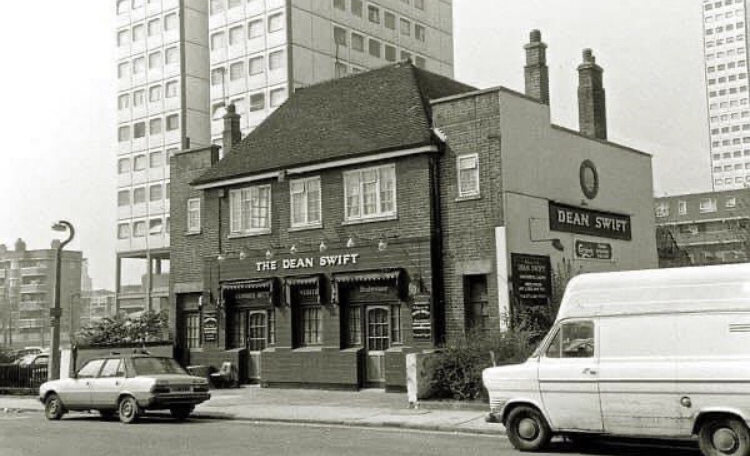The Dean Swift, Shadwell

The behaviours of a pubs current punters and acceptance of new faces can have a drastic affect on the sustainability of an establishment. Contrary to what some charlatan Instagrammers would have you believe London isn’t all Millionaires’ Row, posh cocktail bars and West London lushes. In most of the city people graft and often need a good soak after a day at the coal-face.
Some people’s requirements are minimal. All certain punters need and cherish is a bit of warmth, a bar to prop up and sensibly priced pints. The Dean Swift in Shadwell was one such institution. As a local pub for local people it had no gimmicks and made no excuses for what it was, simply providing a local public service. It was a real pub and I’m thankful backstreet boozers like this still just about exist. But they won’t for long. There are multiple reasons why pubs close and in this case, a change in demographics and the reduced drinking habits of millennials mean when Shadwell’s current punters pass on there’ll be no-one to replace them.
It saddens me looking at old Ordnance Survey maps seeing the PH signs on scores of street corners. In the traditional Cockney territories of Stepney, Bethnal Green and Whitechapel, despite vital borough protection (which London Borough of Tower Hamlets finally granted to 20 pubs of historical value in August 2019), I worry we’ll be lucky if there are any more than a score remaining in 20 years.
However, there is a counter-argument here that some of this change is self-inflicted. Certain pubs are intolerant of outsiders and do not welcome new faces. That was not true of this particular pub but I’ve encountered it first-hand when certain entrenched locals, who are often hostile to new punters in other establishments, have the cheek to say that nobody comes to the pub and that the community doesn’t support it. Moreover, they never question that perhaps they might be part of the problem.
Humans are by nature territorial but this hostility is lost on some seasoned campaigners. Or is the current generation too soft? Perhaps they’re unwilling to push the boundaries of their comfort zone and meet new people outside of their safe Instagram or Starbucks environments. There is certainly not a black and white answer as to why pubs are continuing to fail and close in some areas especially as there are also a number of historical, social and financial causes. However, it’s something that troubles me and is an issue I regularly ponder in quiet moments of reflection.
The old adage of ‘why can’t we all just get along’ often feels like a hollow sound bite when looking for root causes or pointing the finger of blame at a lack of social cohesion, but are people in their 20s likely to be inclined to sit at the bar with a droning old warhorse in their late 60s? You can likely speculate that common ground would be minimal. Throw in a frosty reception and a visit to a backstreet boozer with old carpet, net curtains and regular servings of venom and vitriol suddenly doesn’t seem like a beverage worth troubling yourself to ‘enjoy’. For youngsters, when there are other cheaper, more inclusive, healthier and, being very frank, pleasurable environments available it’s no wonder the boozer’s days in certain parts of London are numbered.
Personally, I’m a curious type and enjoy hearing people’s stories and tales as you can learn so much from the older generation. But this works both ways and those more senior in vintage need to not disregard those younger than them as there is much to be gleaned from the next hungry and driven generation.
Pubs have made efforts to diversify and attract a younger clientele since the mid-1980s. The names became trendier and the venues transformed into late night establishments, but are go-to alternatives of quiz nights and speed dating now old hat? Do pubs, yet again, need to reinvent themselves and appeal to a whole new customer base?
The Dean Swift rang the time bell for the final time in January 2020. It will of course be levelled for flats but part of the planning application will see a pub on the ground floor. What type of pub that looks like and if any operator will be interested in taking it on in an area where most of the local population are non-drinkers remains to be seen. What is certain is that the pub going way of life in this part of the East End although hasn’t yet flat lined has been in terminal decline since the mid-1990’s.
I’m unsure of the solution to arresting this East End decline but I’ll conclude by stating this is a subject much better sensibly discussed / debated / argued over a cold drink. You know what to do...














